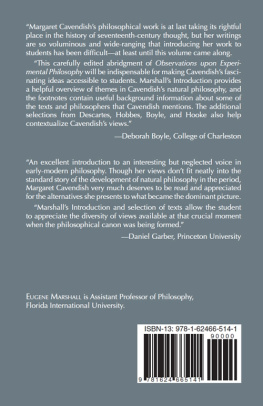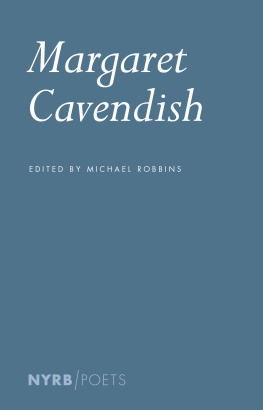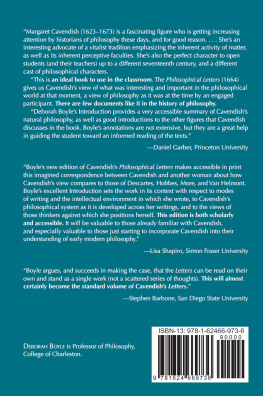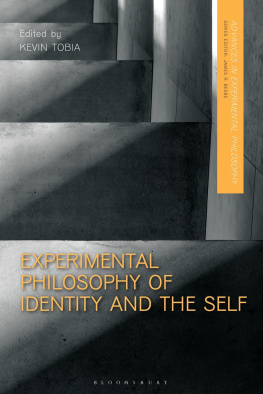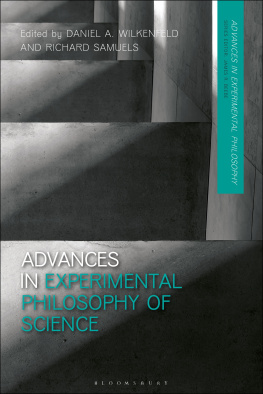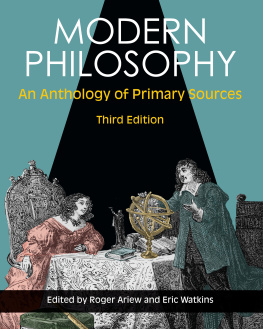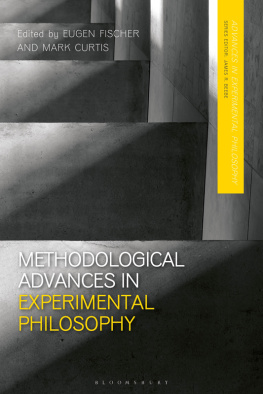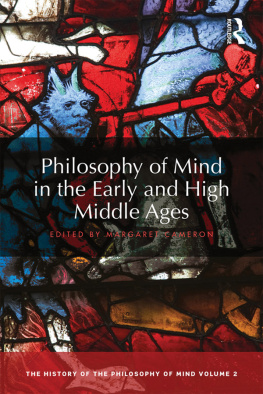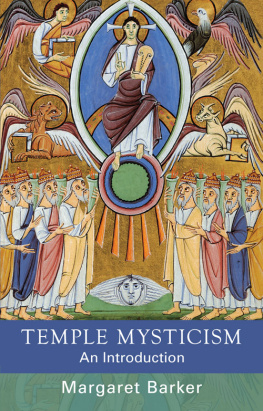Margaret Cavendish - Observations upon Experimental Philosophy, Abridged, with Related Texts
Here you can read online Margaret Cavendish - Observations upon Experimental Philosophy, Abridged, with Related Texts full text of the book (entire story) in english for free. Download pdf and epub, get meaning, cover and reviews about this ebook. year: 2016, publisher: Hackett Publishing Company, genre: Science. Description of the work, (preface) as well as reviews are available. Best literature library LitArk.com created for fans of good reading and offers a wide selection of genres:
Romance novel
Science fiction
Adventure
Detective
Science
History
Home and family
Prose
Art
Politics
Computer
Non-fiction
Religion
Business
Children
Humor
Choose a favorite category and find really read worthwhile books. Enjoy immersion in the world of imagination, feel the emotions of the characters or learn something new for yourself, make an fascinating discovery.
- Book:Observations upon Experimental Philosophy, Abridged, with Related Texts
- Author:
- Publisher:Hackett Publishing Company
- Genre:
- Year:2016
- Rating:3 / 5
- Favourites:Add to favourites
- Your mark:
- 60
- 1
- 2
- 3
- 4
- 5
Observations upon Experimental Philosophy, Abridged, with Related Texts: summary, description and annotation
We offer to read an annotation, description, summary or preface (depends on what the author of the book "Observations upon Experimental Philosophy, Abridged, with Related Texts" wrote himself). If you haven't found the necessary information about the book — write in the comments, we will try to find it.
Observations upon Experimental Philosophy, Abridged, with Related Texts — read online for free the complete book (whole text) full work
Below is the text of the book, divided by pages. System saving the place of the last page read, allows you to conveniently read the book "Observations upon Experimental Philosophy, Abridged, with Related Texts" online for free, without having to search again every time where you left off. Put a bookmark, and you can go to the page where you finished reading at any time.
Font size:
Interval:
Bookmark:
Margaret Cavendish
O BSERVATIONS UPON
E XPERIMENTAL
P HILOSOPHY
Abridged, with Related Texts
Margaret Cavendish
O BSERVATIONS UPON
E XPERIMENTAL
P HILOSOPHY
Abridged, with Related Texts
From the Second Edition, published
in 1668, in London, by A. Maxwell.
Edited, with an Introduction, by
Eugene Marshall
Hackett Publishing Company, Inc.
Indianapolis/Cambridge
Copyright 2016 by Hackett Publishing Company, Inc.
All rights reserved
Printed in the United States of America
19 18 17 16 1 2 3 4 5 6 7
For further information, please address
Hackett Publishing Company, Inc.
P.O. Box 44937
Indianapolis, Indiana 46244-0937
www.hackettpublishing.com
Cover design by Listenberger Design & Associates
Interior design by Elizabeth L. Wilson
Composition by Aptara, Inc.
Library of Congress Cataloging-in-Publication Data
Names: Newcastle, Margaret Cavendish, Duchess of, 1624?-1674 author. |Marshall, Eugene, 1974 editor.
Title: Observations upon experimental philosophy : abridged, with related texts / Margaret Cavendish ; edited, with an introduction by Eugene Marshall.
Description: Indianapolis : Hackett Publishing Co., Inc., 2016. | From the second edition, published in 1668, in London, by A. Maxwell. | Includes bibliographical references.
Identifiers: LCCN 2016008617| ISBN 9781624665141 (pbk.) |
ISBN 9781624665158 (cloth)
Subjects: LCSH: Philosophy of nature.
Classification: LCC B1299.N273 O27 2016 | DDC 192dc23
LC record available at http://lccn.loc.gov/2016008617
ePub ISBN: 978-1-62466-592-9
Modern Philosophy: An Anthology of Primary Sources, Second Edition . Edited by Roger Ariew and Eric Watkins.
Women Philosophers of the Early Modern Period . Edited, with Introduction, by Margaret Atherton.
Ren Descartes, Discourse on Method and Meditations on First Philosophy, Fourth Edition . Translated by Donald A. Cress.
Ren Descartes, Philosophical Essays and Correspondence . Edited, with Introduction, by Roger Ariew.
Thomas Hobbes, Leviathan . Edited, with Introduction, by Edwin Curley.
Mary Wollstonecraft, A Vindication of the Rights of Woman . Edited, with an Introduction and Notes, by Philip Barnard and Stephen Shapiro.
Contents
The page numbers in curly braces {} correspond to the print edition of this title.
{vii}
Margaret Cavendish represents a seventeenth-century voice that has been ignored or minimized for too long. Her English contemporaries knew her work and even felt it necessary to respond to certain of her views, even if they did not always do so by name. But because her views are sometimes odd or unfashionable, and, certainly, because she was a woman writing in the seventeenth century, later generations of philosophers telling the story of our history have omitted hereven, one might say, erased her. Thus, reading her now, and attempting to understand how she was responding to her contemporaries, can help undo that distortion. And, in the end, we might find that she has insightful and interesting things to say.
Margaret Lucas Cavendish, the Duchess
{viii} Specifically, she argued that the variety and orderliness of natural phenomena could not be explained by blind mechanism and atomism, but instead require the parts of nature to move themselves in regular and Leibniz.
When she turned to discuss political and social issues, Cavendishs metaphysical commitments seem to remain. Cavendish was a staunch Royalist and aristocrat; perhaps not surprisingly, then, she argues that each person in society has a particular place and distinctive activity and, furthermore, social harmony arises just when people know their proper places and perform their distinctive actions. She is critical, therefore, of social mobility and unfettered political liberty, seeing them as a threat to the order and harmony of the state. Even so, her writings also contain nuanced and complex discussions of gender and religion, among many other topics.
Despite her conservative political tendencies, Cavendish herself can be seen as a model for later women writers. After all, she wrote dozens of books, at least five of which were on natural philosophy, under her own name, a feat that may make her the most published woman author of the seventeenth century and one of the most prolific women philosophers in the early modern period. In addition to writing much on natural philosophy, she wrote on a dizzying array of other topics and, perhaps most impressively, in a wide range of genres. Her philosophically informed {ix} poetry, plays, letters, and essays are at times as philosophically valuable as her treatises of natural philosophy.
Margaret Lucas was born in 1623 in Colchester into a family of aristocrats and staunch Royalists. She received little formal education, being tutored at home with her seven siblings, of which she was the youngest. She reports having spent much time in conversation with one of her brothers, John, who considered himself a scholar and who would become a founding member of the Royal Society, a group of researchers and natural philosophers tasked by the Crown with improving natural knowledge. She joined the queens court and served as a maid to Queen Henrietta Maria, following her into exile in 1644, during the English Civil War. While in exile she met William Cavendish, then Marquess and later Duke of Newcastle. They were married in 1645.
While in exile in Paris and Antwerp, she reports discussing philosophy and natural science with her husband and his younger brother, Sir Charles Cavendish, who held a regular salon attended by Thomas Hobbes, Kenelm Digby, and occasionally Ren Descartes, Marin Mersenne, and Pierre Gassendi, which came to be known as the Cavendish Circle. Margaret herself reports having attended several dinners at which these philosophers were present, though she denies having spoken to them about any but the most superficial matters.
While her husband remained in exile, she returned in 1651 and again in 1653 to England. This was during the reign of Commonwealth, during which her husband, were he to have returned, would have had to renounce his Royalism and swear fealty to the Commonwealth, as was required by the republican Parliament of the time. The Parliament did not extend that requirement to women, however, as the Parliament claimed that women were not capable of such political acts.
During the 1653 visit she arranged for the publication of her first two collections of writings, Poems and Fancies and Philosophical Fancies . She reports having delivered the second, more philosophical treatise a few days too late to have it included with the first in a single publication, which had been her original intention. The publisher was Martin and Allestyre, at the Bell in St. Pauls Churchyard, a well-regarded publisher who later became the official publisher for the Royal Society. It is truly {x} remarkable that she was able to publish her works, as few women indeed published philosophy in England in the seventeenth century, much less under their own name and while in exile.
With the restoration of Charles II to the throne, she returned to England with her husband and continued to write. In addition to publishing on natural philosophy, she also wrote essays on a dizzying variety of other topics, including the nature of poetry, the proper way to hold a feast, fame, womens roles in society, and so on. She also wrote many plays and poems, as well as a fantastic utopia, The Description of a New World, Called the Blazing World , in 1668.
There may have been some controversy over a woman publishing works on natural philosophy, because she felt the need to include several epistles, both from herself and from her husband and brother-in-law, attesting to the fact that she had written these works herself. Indeed, she returns to defend herself as an author and natural philosopher at a variety of places in her work, often in epistles to the reader. She also defends the propriety of her being so bold as to write in her own name and to think her thoughts worthy of publication. Her several discussions of fame are worth noting in this context.
Next pageFont size:
Interval:
Bookmark:
Similar books «Observations upon Experimental Philosophy, Abridged, with Related Texts»
Look at similar books to Observations upon Experimental Philosophy, Abridged, with Related Texts. We have selected literature similar in name and meaning in the hope of providing readers with more options to find new, interesting, not yet read works.
Discussion, reviews of the book Observations upon Experimental Philosophy, Abridged, with Related Texts and just readers' own opinions. Leave your comments, write what you think about the work, its meaning or the main characters. Specify what exactly you liked and what you didn't like, and why you think so.

